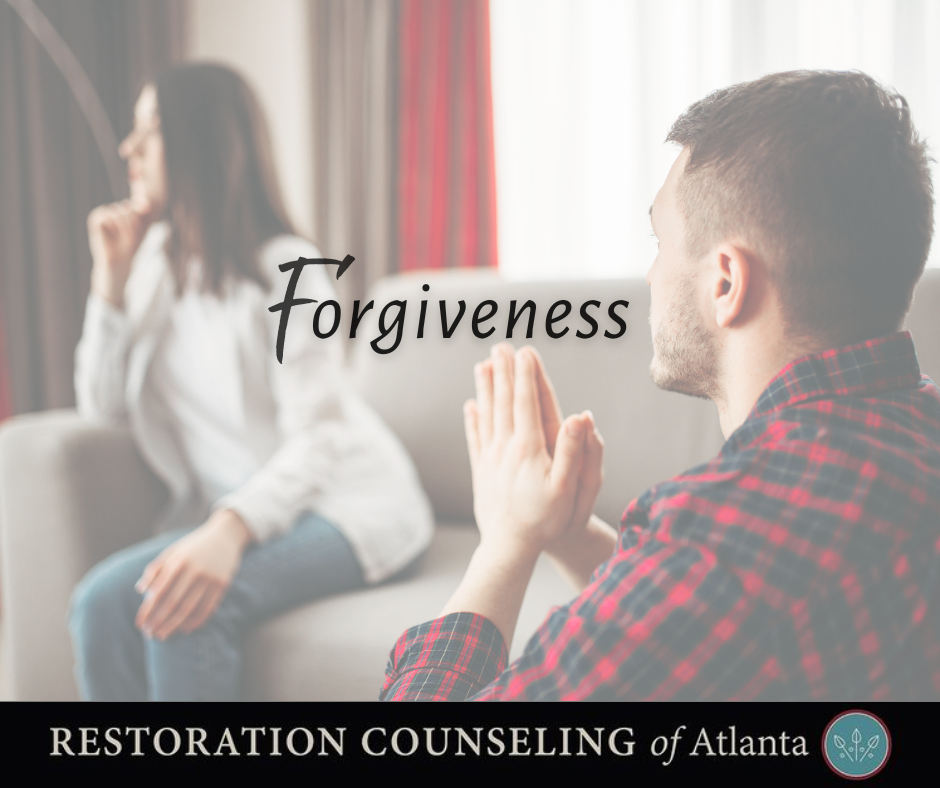STRONG OR WEAK?
The word ‘forgiveness’ can often elicit a variety of emotions. Before you read any further, I invite you to pause and reflect on the honest emotions and/or physical reactions that come to your mind when you think about the act of forgiving. You may even consider writing down the emotions or reactions from your self-reflection. Set aside your list as we will circle back to the emotions associated with this topic.
WHAT FORGIVENESS IS AND WHAT IT ISN’T
Forgiveness is:
- Between you and God
- A decision or a choice
- An act we are called to by God, who forgave us by sending Jesus to die for our sins
Forgiveness is not:
- A feeling
- Justifying the other person’s actions or behavior
- Forgetting about the pain or wrongdoing
- Doing it because we feel obligated to
- Denying the pain we are feeling
- Asking God to forgive the other person
- Asking the other person to forgive you
- Releasing the anger or other emotions associated with it
- Dependent on the other person accepting it
- Reconciliation*
A MATTER OF PERSPECTIVE
As a mom, I have been guilty of telling my child that she was fine after she fell and hurt herself. The adult perspective inside of me failed to acknowledge her pain or justify her emotions because I didn’t see a broken bone or even a bloody mess. Rather, I only saw a scrapped knee. In that moment, I was quick to tell her, “You’re fine, get up and keep playing.” In that moment, I failed to see things from her perspective, as a young child who just had a fall on the playground, and I failed to justify her emotions. Every human has an innate desire to be seen and to be validated.
Although you may never know for sure why someone has wronged you, it can sometimes be helpful when you see the other person through the lens of their pain. Often times unresolved trauma or pain will lead us to project that pain onto others. You know the old saying, “hurt people hurt people.”
An example of this may be a boy who grew up in a verbally abusive environment and whose parents were critical of him. He becomes a father himself one day to only repeat the behavior through unrealistic expectations and extremely high standards of his own child. This may leave the child feeling like they are never good enough for their father. Seeing someone through the lens of their pain would be to look at this example and try to understand the father’s unrealistic expectations. To be clear, this is not the same as justifying or excusing someone’s wrong behavior. Rather, like adding pieces to a puzzle, it can give us insight and maybe help us to make some sense of why they acted in such a manner.
Lastly, it is important to sit in the pain long enough to acknowledge and feel the emotions. Our first instinct or protective coping mechanism may be to minimize it or push it under the rug. However, we need to honor our emotions. Emotions aren’t good or bad; emotions are just emotions. Your feelings are your feelings, and no one can tell you that what you are feeling is wrong. Someone may choose to disagree with your perspective or interpretation of an incident, but no one can tell you what to feel.
Just as I had an opportunity on the playground that day to let my child be seen by me and to validate her emotions; you can choose to validate your own emotions by sitting in them, acknowledging and naming them, and honoring how you are feeling. Take time to journal and reflect on your feelings and how you have been mistreated. But be intentional about not getting stuck in the feelings of pain, and move towards healing and forgiving.
WHY FORGIVE?
Kathi Norman (2017) outlined some of the health implications that unforgiveness has on one’s health in her article entitled, Forgiveness: How Manifests in our Health, Well-being, and Longevity. “Failing to forgive, or unforgiveness is the practice of engaging in ruminative thoughts of anger, vengeance, hate, and resentment. These have unproductive outcomes for the ruminator, such as increased anxiety, depression, elevated blood pressure, vascular resistance, decreased immune response, and worse outcomes in coronary artery disease. Practicing forgiveness enables the transgressed individual to reduce their engagement in rumination, thus reducing their experience of anger, resentment, and hate. Forgiveness, then, is a pathway to psychological well-being and health outcomes.”
The moment I start hating a man, I become his slave. I can’t enjoy my work anymore
because he even controls my thoughts. My resentments produce too many stress hormones
in my body, and I become fatigued after only a few hours of work. The work I formerly
enjoyed is now drudgery. Even vacations cease to give me pleasure. The man I hate
hounds me wherever I go. I can’t escape his tyrannical grasp on my mind.
– S. I. McMillen, M.D., None of These Diseases
Additionally, when we let unforgiveness harbor in our hearts we become a slave to it, and it has power over us. In her book, Forgiving What You Can’t Forget, Lysa TerKeurst states, “The more our pain consumes us, the more it will control us.” Unforgiveness causes us to be controlled by something outside of ourselves. To forgive is to actually gain power over the wrongdoings of others. As followers of Christ, we are called to forgive and not become a slave to anything or anyone. When we are set free, we actually receive power over what once controlled us.
So you are no longer a slave, but God’s child; and since you are his child,
God has made you also an heir. Galatians 4:7 (NIV)
Be kind and compassionate to one another, forgiving one another,
just as in Christ, God forgave you. Ephesians 4:32 (NIV)
It is for freedom that Christ has set us free. Stand firm, then, and do not let
yourselves be burdened again by a yoke of slavery. Galatians 5:1 (NIV)
*Reconciliation is between you and the person who caused you pain. Reconciliation is dependent on another person. Since reconciliation and forgiveness are not the same things, it is important to note that forgiveness is not dependent on reconciliation. We are called to forgive ourselves and others as Christ has forgiven us. While God desires reconciliation among His children, it is not always wise or safe to reconcile. Please seek out professional guidance from your church leadership or a therapist at Restoration Counseling of Atlanta if you have questions or concerns about reconciliation.
STEPS TOWARDS FORGIVENESS
I invite you to consider the following questions to contemplate how you can move towards forgiveness.
- Who in my life may I need to forgive?
- What stands in the way of me forgiving others?
- Do I need to forgive myself for anything?
- What prevents me from forgiving myself?
- Where in my life can I be more compassionate to myself?
Let me extend grace and compassion to you if this topic stirs up strong emotions or physical reactions or is a difficult concept that you may be wrestling with. I would love to talk with you! You can email me at Heidi@restorationcounselingatl.com to schedule an appointment or a free 15-minute consultation phone call.

Written by Heidi Sawyer, MS, LPC
Roswell Location
heidi@restorationcounselingatl.com, ext 116
Heidi works with adolescents ages 14 and up and individuals. She assists with college and career exploration and planning, anxiety, depression, relationship challenges, spiritual issues, grief, life transitions, goal setting, and self-confidence challenges.
Reference
Norman, Kathi, “Forgiveness: How it Manifests in our Health, Well-being, and Longevity” (2017). Master of Applied Positive Psychology (MAPP) Capstone Projects. 122.

